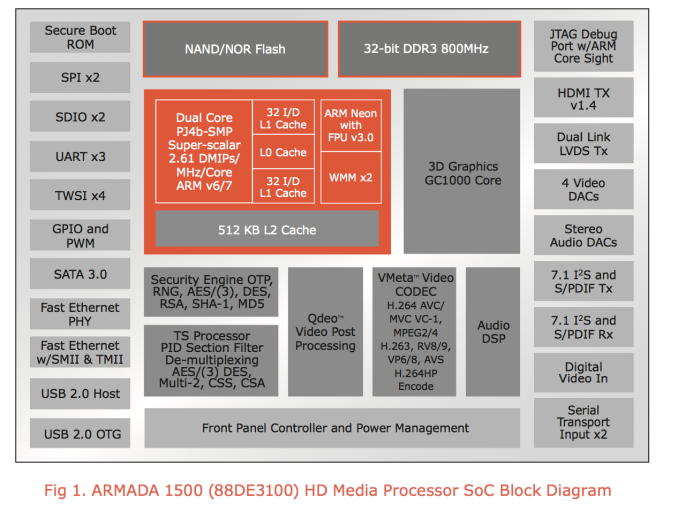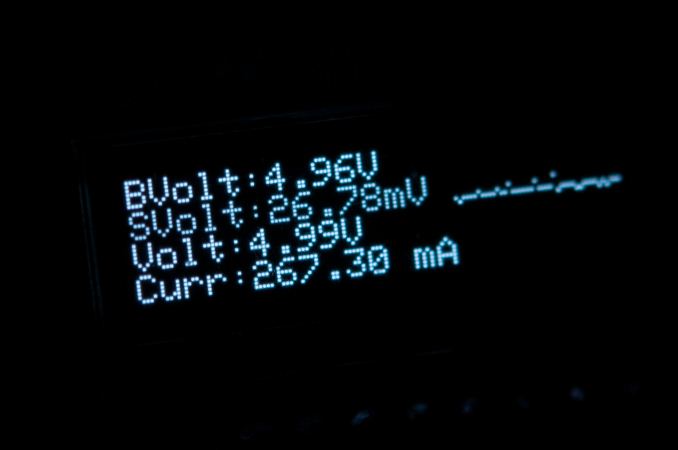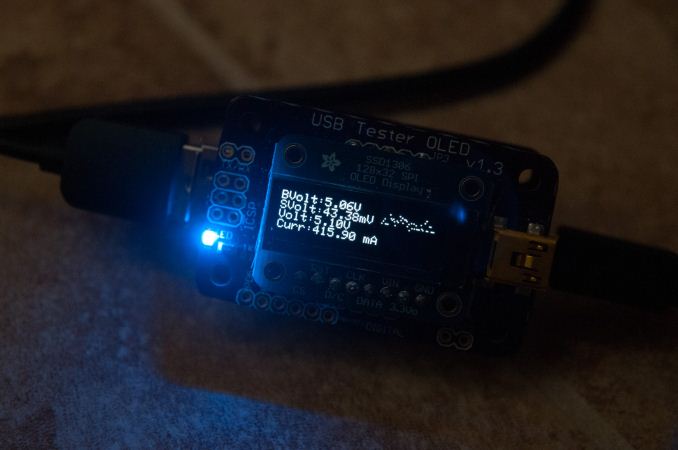Google Chromecast Review - An Awesome $35 HDMI Dongle
by Brian Klug on July 29, 2013 9:45 PM EST- Posted in
- Smartphones
- Media Player
- Android
- Mobile
- HDMI
- Chrome
- Tablets
- Chromecast
Inside Chromecast
Inside the Chromecast it’s also a simple affair, I took a look at the FCC disclosure for the Chromecast which had internal images up right after the event, and noted inclusion of a Marvell 88DE3005 SoC and AzureWave NH–387 WiFi combo chip. On the backside is 512 MB of Micron DDR3L memory and 2 GB of flash. The antenna for the WiFi combo is printed on the PCB off to the side, there’s no diversity or anything special, just a single PCB antenna.
The Chromecast supports just 802.11b/g/n (2.4 GHz), sadly no 5 GHz is included. That’s somewhat alarming if you’re in an area where 2.4 GHz is congested to the point of being unusable (just about any major urban area), and even more so since streaming applications demand a good QoS for good experience. I have no doubt that 2.4 GHz-only was chosen for cost reasons here, but I would’ve gladly paid $5–10 more for 5 GHz and eliminating that as a potential problem.
Best I can tell, the Marvell 88DE3005 is a cut down, perhaps binned version of the 88DE3100 SoC that has shipped in Google TV for some time now with just a single CPU core enabled. Some hacking done by enthusiasts has confirmed from /proc/cpuinfo that only a single core is visible to the OS, and that the Chromecast also interestingly enough really runs Android, not Chrome, and includes a build.prop file like you’d expect an Android device to.
Google no doubt chose this Marvell SoC in part thanks to the presence of hardware VP8 decode, and I have no doubt YouTube on the device brings down VP8 versions of videos when available, and the Chrome tab to Chromecast streaming uses VP8 as well. Of course there’s hardware decode of H.264 High Profile onboard as well for Netflix and other YouTube videos without VP8 versions. Google lists the supported codecs on their Google Cast SDK page.
Back when the power situation was unknown and still steeped in conflicting information about HDMI power delivery (again, it can't be powered by MHL-HDMI ports which can supply up to 500 mA at present spec, and HDMI doesn't supply enough current, just 50mA), I set about measuring power. I have a handy USB power meter which sits in line with devices and shows a small graph as well as data on its OLED display. I stuck the meter in line between the microUSB power supply provided with Chromecast, and the Chromecast, and measured around 420 mA at peak while decoding either a 1080p Netflix stream or Chrome tab streamed to it, and around 250 mA at idle. All of those are at 5 V, so at peak the Chromecast draws around 2 watts, at idle around 1 watt. Of course if the Chromecast is plugged into your TV’s USB port, chances are when the TV is off power is cut to USB, so idle really is completely off. It’s obvious to me that Chromecast definitely leverages that hardware decoder for both VP8 and H.264 processing to get these very low power numbers.


-004_575px.jpg)
-003_575px.jpg)











105 Comments
View All Comments
medi02 - Tuesday, August 6, 2013 - link
Article starts with author stating that he doesn't hate Nexus Q.But what if I don't know what Nexus Q is?
Sigh...
AnnonymousCoward - Friday, August 9, 2013 - link
This article is missing a concise opening on what the Chromecast functionally does.siyangqiu - Tuesday, August 20, 2013 - link
For $35, you can also get a Rikomagic device off of Amazon. The difference is that while the $35 one is a bit sluggish, it does run full Android 4.0.4 (or newer if you get a newer version that also costs a bit more) with Play Store and everything. Think of it as an Android tablet without a touchscreen or battery. Just plug it into your TV, add in a usb mouse/keyboard (preferably wireless) and you are good to go. It also supports Airplay and MiraCast.siyangqiu - Tuesday, August 20, 2013 - link
Also, it comes pre-rooted and the community has already hacked together CWM and Cyanogenmod 10.1.bghitt1@comcast.net - Tuesday, September 17, 2013 - link
I have a question. I want to stream Netflix to my HDTV, but I want to have subtitles because my husband is hard of hearing. When I stream from my cable router via my Samsung Blu-Ray, I cannot get subtitles when I push the Subtitles button on the remote. BUT I can get subtitles (closed caption) on my iPad when streaming from Netflix. If I get a Google Chromecast, will I be able to get the movies WITH subtitles on my HDTV? It is also a Samsung product, and it supports subtitles on Netflix DVDs. Any advice appreciated!